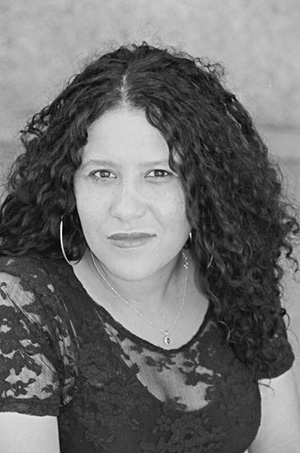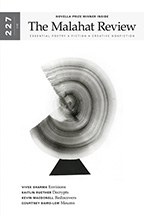Flight: Rose Morris in Conversation with Zilla Jones

Malahat Review volunteer Rose Morris talks with Zilla Jones, winner of the 2021 Open Season Award for Fiction with her story, "Crossing."
Zilla Jones is an African-Canadian criminal defence lawyer, anti-racism educator, mother, singer and writer from Winnipeg, who has been writing since the age of three, but only began submitting her work in late 2019. Since then, she has been longlisted for the CBC short fiction competition, shortlisted for the Writers Union of Canada short prose competition and the Fiddlehead fiction contest, and won Honourable Mention in the Room Magazine fiction contest. Her work is published in Prairie Fire magazine. During the pandemic, she finished the first draft of her novel, The World So Wide.
Read what judge Philip Huynh had to say about her winning story.
What does winning The Malahat Review's Open Season Award for Fiction mean for you?
This is a huge honour and a big surprise for me. I only started submitting my work in the fall of 2019, and since then, I have gotten to know so many amazing writers, in person or through their work. I have been longlisted, shortlisted, and selected as the Honourable Mention, but this is the first competition I have won (since then, I have learned of another.) The competition is fierce, and to be chosen for this award so early in my public writing journey is very exciting. It can be difficult to know if the work I put out there connects with people or accomplishes what I want it to, and so this win lets me know that I have attained that goal. “Crossing” is a story very dear to my heart that felt like a bit of risk to write, and to have it win this award is extremely special.
I would write with or without an award, but I cannot deny that external validation feels great and helps to motivate me. I have finished my first novel and am preparing it for submission, and I hope that this award will help to open doors as my novel begins its travels.
Has the pandemic changed the way you go about your writing routine/process at all?
My writing routine really only developed during the pandemic. Before the pandemic, I always wrote sporadically but I felt that, between work, children, spouse, home, and multiple interests and activities, I did not have enough time to devote to writing seriously. That began to change in fall 2019 with the death of a close friend who had always encouraged me to write; his death made me realize we are not guaranteed time on this earth and we need to do what we are called to do now and not wait for the perfect time. But I had not really settled into a writing routine as of March 12, 2020, when we entered a new reality with the first lockdown. The schools closed and my children were home, and my work moved primarily to the home. My social life and outside activities were no more. It was a terribly stressful time and a time of loss and grief, but I also found myself compelled to write, both to process events of the pandemic and to escape the pandemic. I wrote every day—sometimes in the middle of the night when I couldn’t sleep, sometimes early in the morning before anyone woke up, and all weekend when I could no longer see friends or family. In the first three months of the lockdown, I finished the first draft of my novel that I had been working on for seven years.
Then two months into the lockdown, George Floyd was murdered by Minneapolis police, and North America and the world were swept by protests for racial justice, police abolition or reform, and demands for an end to systemic racism and an acknowledgement that Black lives matter. All the stories I had always had inside me on these topics suddenly felt safe to tell, and it seemed as if people might finally be ready to receive them. That is when I really began to write in earnest.
It’s simple for me; I have continued to write every day, sometimes for a few minutes, sometimes for hours. I tend to just go with the flow and write things down as they come to me, then go back and edit. I have been fortunate during the pandemic to connect with several other writers through various groups, classes, and connections, and a highlight of this time has been exchanging work with them, giving and getting feedback. I do this on a regular basis and it is the single most helpful thing for my writing. I am also fortunate to have been selected for a mentorship through the Manitoba Writers Guild, and I am enjoying the online sessions with my amazing mentor, Angeline Schellenberg.
Your winning story, "Crossing," is set in a past historical period. How do you go about getting into the right mindset to write from the perspective of a character living in the past?
Quite a lot of my work is set in the past, as I have always had a strong interest in history and what it can tell us about the present. Because I have read and studied a lot of historical material, I am usually already starting with a sense of the basic facts of the period I plan to write about. But I will also do some research before I begin writing. I will go online and find articles and encyclopedia entries about the event or time period I am writing about, and if I have books on hand about the same thing, I will read those too. A large part of my novel takes place during the coup and invasion that occurred in Grenada in the Caribbean from 1979-1983, and I read close to twenty books about those events before writing about them.
“Crossing” takes place on a slave ship, and that is a horror that still lives somewhere in my DNA. As Bob Marley sings, “I remember on the slave ship / How they brutalized our very souls.” I have often marveled at what my ancestors endured, and many times, I have pictured the sights, sounds, and smells of the cargo hold where they were stacked during the Middle Passage. So I have been preparing myself to write this story all my life and it felt very natural to enter that space. The world of the past feels so present and current to me; I grew up with a strong oral tradition with stories being handed down to me from previous generations, so the past is never really the past but dwells within me every day. I think that is why so often, as in “Crossing,” I write my stories set in the past in the present tense—because I feel like I am there and I want the reader to experience the same immediacy.
There are a number of moments in "Crossing" when the protagonist is trying to make sense of her white captors and describes them with a blend of confusion, curiosity, and fear, using the same language that has historically been used to other Black culture. One such moment is when she says "some say they are cannibals, while others think we are to be ritually offered to their gods." Can you talk a little bit about the impact of turning this language around to describe white colonialism?
My intent in writing this story was to show the first encounter between Europeans and Africans through the eye of an African, because we hear so much more about the European view of the places they colonized than the reverse. Of course I am writing in English rather than the Akan language of the protagonist because, thanks to slavery, as a child of the Diaspora I do not speak an African language. But I was trying to only use descriptions and reference points that would have been known to an Akan girl at that time. From what I know of the oral tradition, many Africans in pre-colonial times thought that white people were ghosts or demons. And when the first appearance of white people was to capture, beat, and rape, that must have only intensified African fears.
This story was written during the Black Lives Matter protests of the spring of 2020 and was a direct response to the events that sparked them. I was thinking a lot about how we got to this point and how systemic racism developed. The violence and control exercised over Black bodies during the slave trade and slavery itself became modern-day policing. It is not surprising that Africans and Europeans, looking and living so differently from one another, might feel curiosity and fear when they first met. But this was not an equal encounter; Europeans exploited Africa and mistreated her people in a way that was not reciprocated. European beliefs in their superiority had devastating effects which continue today with the legacy of white supremacy. My deliberately unnamed protagonist in this way represents all of mother Africa, her hopes and dreams, and how she was beaten and crushed, but still could not be destroyed. My hope was that, in telling her story, a larger story would be conveyed about the relationships between nations and peoples today.
The ending of "Crossing" clearly references the "flying Africans" legend, which, for readers who may not be aware, is a story of enslaved Africans sprouting wings and flying to freedom. That legend is purported to have originated with the event of a mass suicide of a group of enslaved people at Igbo landing in 1803. How important are legends and folktales in your writing and how do you go about blending mythology and historical fact?
Yes, flight is a powerful image throughout the cultural traditions of the Diaspora. Toni Morrison’s Song of Solomon visits this image very clearly. I am not sure that I would call stories of flight simply legends. They were survival mechanisms that our ancestors held onto. In the Caribbean, where my family is from, there are so many rituals associated with death, and one is that when someone dies, their soul flies away after nine days and you must keep watch until then and mark an X on the wall where they leave.
I wanted to contrast the final journey of the protagonist with the slower, earthbound passage of the ship traveling into slavery. Through flight, the protagonist resists bondage and denies her captors the profits they would gain from using and selling her body. So I knew that at the moment she leapt from the ship, for a brief moment, she would feel like she was flying, and would appear to be flying to the other slaves watching her. At the same time, I knew that this flight would not last for her body: that while her spirit might fly away home, her body would end up at the bottom of the Atlantic, as so many bodies did along the routes of the Middle Passage. But the fact that, for that short time, she flies, gives hope to an otherwise tragic ending.
And this, to me, is the significance of legends and folktales. I was raised on these stories: Anansi the trickster spider was a popular Caribbean figure of my childhood. Once I got a little older, I took the stories less literally and became more interested in their origins—why this character? What is the story trying to tell us about life today? I actually have not yet written as much folklore as I want to. I am currently working on a story, perhaps in my wildest dreams to someday make it into a novel, that is about zombies: not zombies as we see them in North America, but zombies as they are known in the Caribbean—slaves who committed suicide and so are doomed to live in their enslaved bodies forever. These stories are a way of keeping cultures and traditions alive and drawing strength from them. Beliefs such as the idea that you could fly away from bondage, and that if you endured, your body would someday be free, must have sustained generations of my ancestors during slavery and the difficult years afterward, and looking back to those stories now is my way of thanking them for their perseverance that enabled me to be here.

Rose Morris
* * * * * * * *









